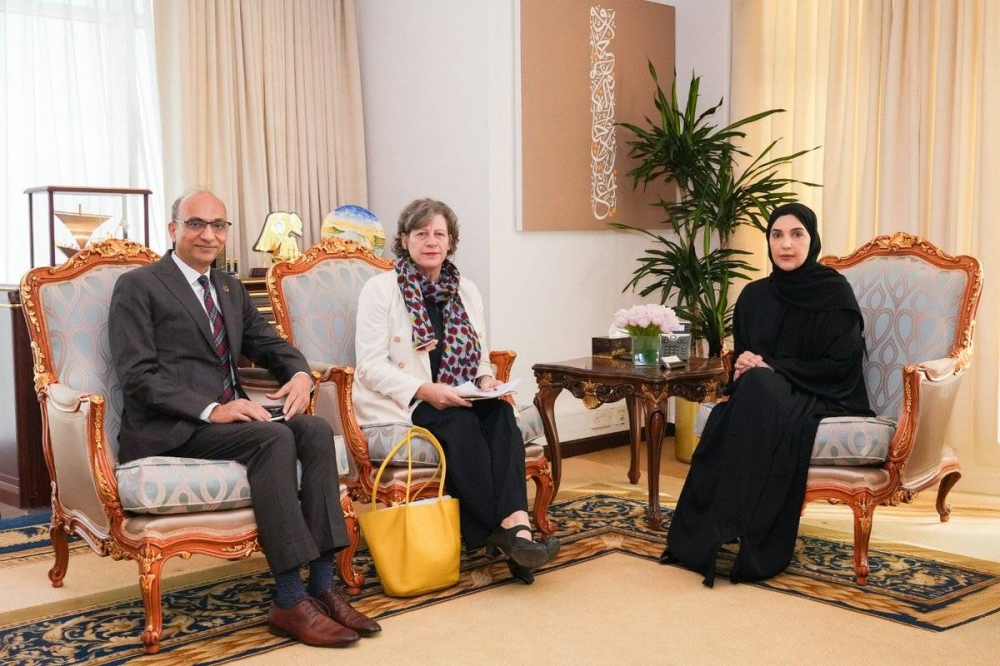HE National Human Rights Committee (NHRC) Chairperson Maryam bint Abdullah Al Attiyah met Monday in Doha with United Nations Development Program (UNDP)'s Head of Rule of Law, Security, and Human Rights Katy Thompson.
In attendance was Head of UNDP Office in Doha Biplove Choudhary.
The NHRC said in a statement that the meeting discussed activating the partnership between the two sides, the possibility of enhancing regional cooperation, working to enhance the capacities of national human rights institutions to address human rights challenges, providing innovative digital solutions, and promoting discussions on digital rights to foster human rights monitoring, advocacy and education.
The statement explained that a tripartite coordination meeting was held between the NHRC, the Doha-based Arab Network of National Human Rights Institutions (ANNHRI), and the UNDP, during which the parties stressed the importance of continuing the partnership and benefiting from the State of Qatar's experience as a center for holding meetings and exchanging knowledge for national human rights institutions in the Arab region, with a focus on common priorities such as environmental rights, labor rights and gender equality, in addition to holding conferences in Doha on key topics to address global human rights issues, such as business and human rights, digital ethics and AI, and the intersection of human rights and climate justice.
It pointed out that the coordination meeting called for benefiting from the State of Qatar's participation in global human rights mechanisms to facilitate the exchange of strategic and technical knowledge for effective advocacy in the region, and working to establish a repository based in Doha for best practices and case studies.
It also called for enhancing the work of national human rights institutions in implementing effective policies and programs, in addition to working to present initiatives that include exporting the results of regional and global participation through knowledge products and programming between countries in the region to address common challenges, which contributes to facilitating cooperation between countries and deepening strategic partnerships with international organisations, including the Office of the United Nations High Commissioner for Human Rights and the Global Alliance of National Human Rights Institutions.
The NHRC affirmed, through its statement, its readiness to cooperate with the UNDP by working to implement the objectives of the NHRC's 2024-2030 strategy, which intersect with the objectives of the UNDP, noting the start of holding a roundtable meeting during the first quarter of this year with the United Nations House, to coordinate the executive activities that can be organized by the two sides.
In addition, ANNHRI officials detailed the key strengths of its previous cooperation with the UNDP, as the network has come a long way in fruitful cooperation in the field of building and enhancing the capacities of national institutions that are members of the network, in addition to unifying opinions on specific topics of common interest and priority, completing the methodological guide for monitoring human rights during elections, and cooperating in implementing activities.
The ANNHRI recommended the necessity of completing the elections program through training programs on the methodological guide after converting it into a training guide and programs that would enable national institutions to follow up on countries implementation of the 2030 Agenda for Sustainable Development, and further cooperation with the UNDP to include spreading the culture of human rights at the governmental and popular levels, and empowering and supporting institutions in this context.
It also recommended targeting government cadres and parliaments in these programs to achieve harmony between national legislation and international human rights standards, and to ensure that national legislation does not conflict with signed agreements, taking into account the focus of future programs on local challenges and needs that differ from one country to another, and not neglecting work at the regional level, in addition to cooperating with the UNDP in preparing a training plan to enhance the capacity of national institutions that are members of the network in using digital technology and artificial intelligence, and developing their capabilities in monitoring, documentation, and preparing impact measurement reports, collecting information and data, analysing, documenting, and using them in reports, and drawing conclusions.

